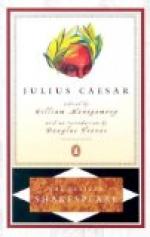|
This section contains 27,495 words (approx. 92 pages at 300 words per page) |

|
SOURCE: “The Rhetoric of Combat: Greek Military Theory and Roman Culture in Julius Caesar's Battle Descriptions,” in Classical Antiquity, Vol. 18, No. 2, October, 1999, pp. 273-329.
In the following essay, Lendon explains how Caesar adapted Greek theories of warfare to better reflect Roman values and culture, particularly the Roman emphasis on courage.
War eclipses all other subjects in the classical historians: not without reason did the Cretan in Plato's Laws (625e) describe war as the permanent condition of mankind. Battle descriptions in ancient authors are legion; Xenophon's Hellenica alone describes or mentions over one hundred and fifty military engagements.1 So too is modern interest in old battles perennial. A gigantic scholarly literature seeks to locate ancient battlefields, to reconstruct the movements of armies upon them, and to divine the strategies of the great captains. Methods improve with time: the floppy sun-hat of today's wanderer over ancient fields shelters modern instruments...
|
This section contains 27,495 words (approx. 92 pages at 300 words per page) |

|


